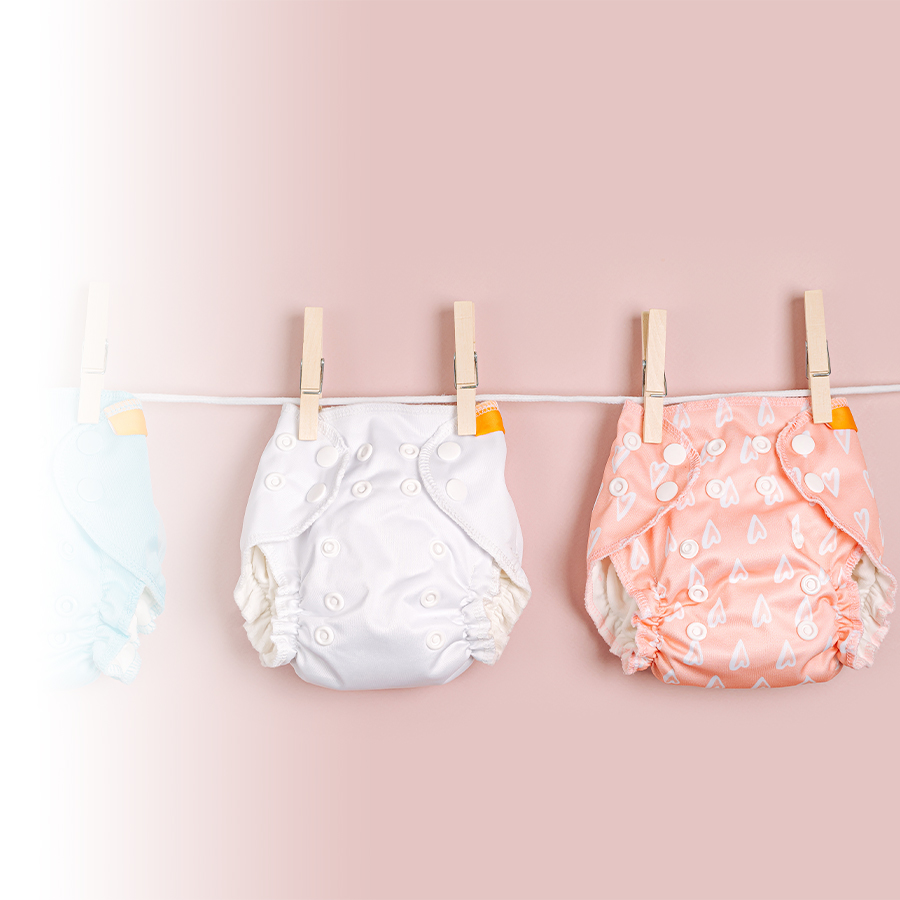Choosing between cloth or disposable diapers for baby is important for the environment, but other aspects should also be considered.
Ecological issues
From birth to toilet training, your baby will go through many diaper changes—6000 on average. If you use disposable diapers, that's about a ton of waste that will take nearly 500 years to decompose!
Because cloth diapers are reusable, the amount of waste produced will be substantially reduced. This is a significant advantage from an environmental perspective. They still have a rather high environmental cost (use of water, energy and certain products such as pesticides, transport of fibres and of the final product, etc.) at the time of production and manufacturing.
It is with time and optimal use that their environmental cost is reduced. In fact, if diapers are used properly, used for several children, and washed under optimal conditions, they become increasingly worthwhile for the environment. When they are washed in cold water in a high capacity washing machine with a minimal amount of safe laundry detergent, and allowed to air dry, then the environmental cost is considerably reduced.
Although a certain amount of water, energy, and detergent is needed to wash them, it is believed that in our Canadian context, their environmental footprint is still less than that of disposable diapers, given our easy access to water and energy compared to other places in the world. Future studies may be needed to more accurately assess the environmental impacts of the various options.
Benefits for your child’s health and development
Disposable diapers contain a number of chemicals and are made of less breathable material. These characteristics are likely to promote skin irritation and redness. Cloth diapers have the advantage of being made of natural fibres, usually cotton, hemp, bamboo or microfibers. They allow the skin to breathe better, which reduces skin irritation.
There is some evidence to suggest that cloth diapers may help with toilet training. This is because they are not as effective in keeping the skin dry when they are soiled—the increased discomfort may encourage the child to become toilet trained more quickly. However, this claim remains to be proven by additional scientific research.
It is also important to note that more prolonged exposure to humidity which sometimes results from the use of cloth diapers can expose the child to diaper rash. For additional information, read the following text: Diaper rash—gentle preventive care. Speak to your pharmacist for advice about the prevention and treatment of diaper rash.
A cost-effective advantage
Cloth diapers have a definite economic advantage. Although they cost more than disposable diapers, the fact that they are reusable allows you to save money in the end. They are even more cost-effective if you plan to have more than one child, as they can be worn by each of your little ones.
It is interesting to note that many municipalities offer a financial assistance in the form of a grant to families who purchase cloth diapers. Find out if you are eligible.
Some advice
Here are some tips to help you make the most of cloth diapers if you choose to use them:
- Change diapers as often as necessary, ideally at least every three hours.
- If there is stool in the diaper, start by flushing it down the toilet.
- Clean your baby's bottom with warm water using a soft washcloth. You can add a small amount of gentle fragrance-free soap with a physiological pH. Rinse well. Try to avoid cleansing wipes, as they are often more irritating to the skin.
- Wait until your baby's skin is dry before putting on a clean diaper. You can gently tap the skin dry with a clean towel.
- Do not soak diapers before washing. Instead, it is recommended that soiled diapers be stored "dry", without rinsing, in a diaper container.
- Follow the diaper manufacturer's instructions for cleaning and drying. This will extend the life of the diaper.
- Use a detergent suitable for cloth diapers when laundering to avoid residue build-up and reduce the risk of irritation.
You can rely on your pharmacist for any health-related matters! They are available to answer your questions and offer advice.


